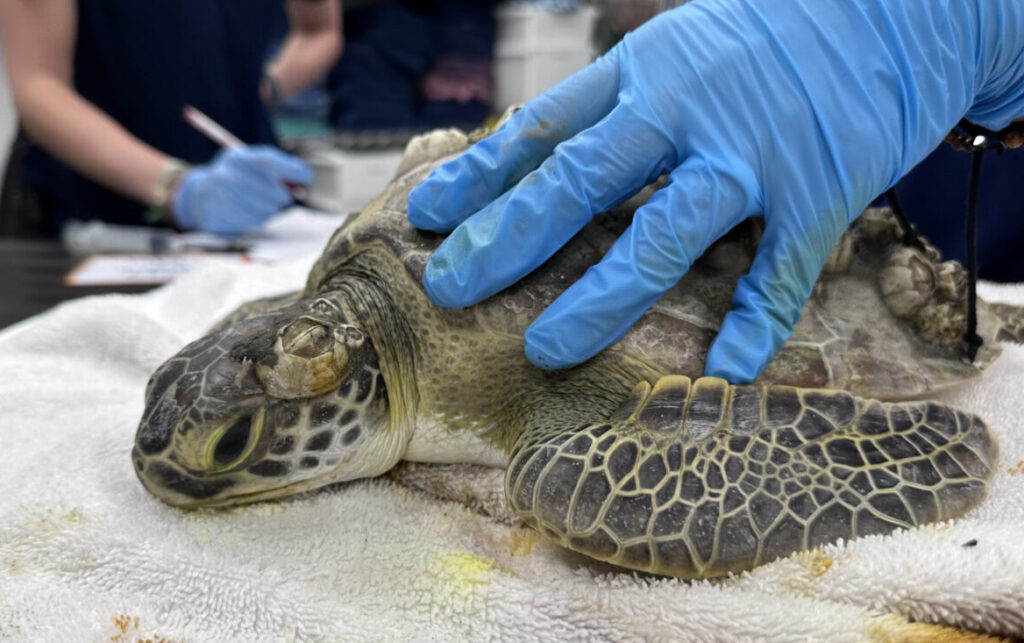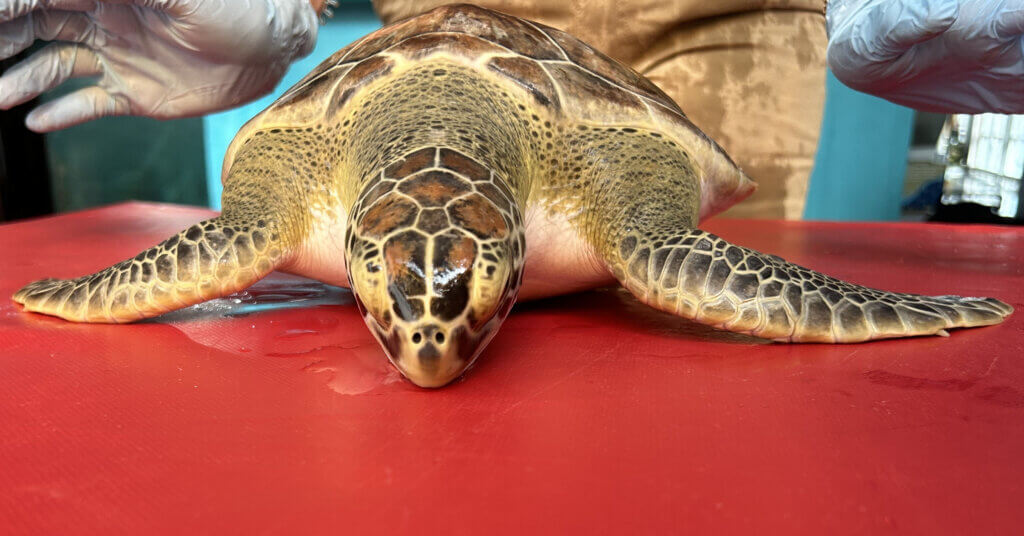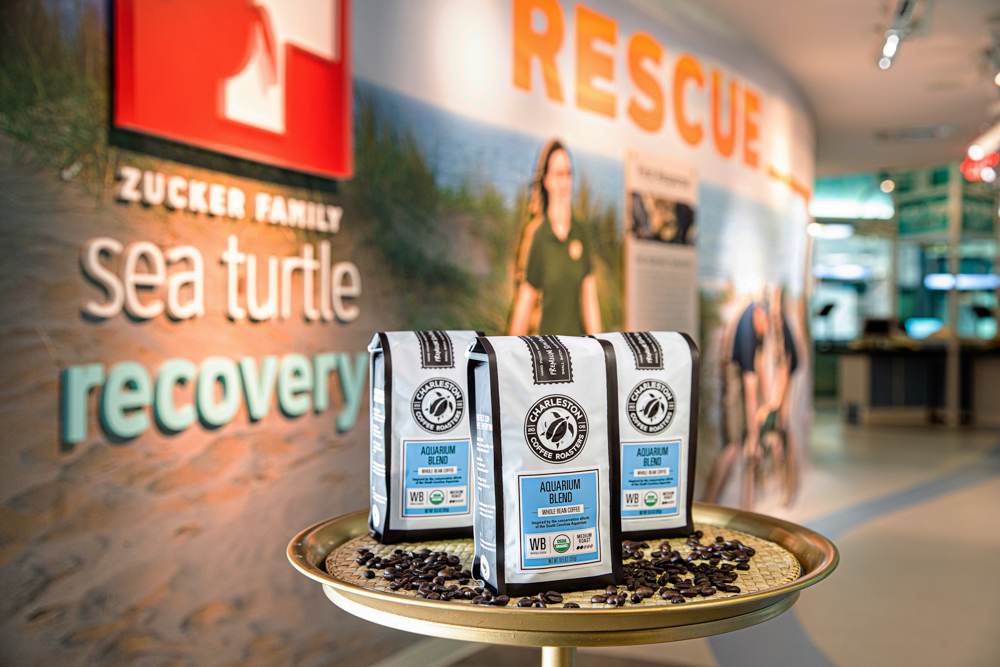Meet Java the Sea Turtle
Java is a juvenile green sea turtle species known as Chelonia mydas and weighs 6.75 lbs (3 kilograms). Java’s sex is unknown at this age. Green sea turtles may grow to be 250 lbs in size when mature! Java was named by Charleston Coffee Roasters consumers and South Carolina Aquarium fans and was selected to be the winning sea turtle name from 1,746 names submitted.
Java was stranded on Hilton Head Island, South Carolina and found by a local resident in coastal pluff mud, which has been described to be like quicksand and commonly found in the Lowcountry in salt marshes and on the shorelines of South Carolina. The resident reported the stranded turtle to the South Carolina Department of Natural Resources (SCDNR), and the Hilton Head Island Sea Turtle Patrol Team members responded. Thanks to the collaborative efforts from the community, this sick and injured sea turtle was able to be safely transferred to the South Carolina Aquarium’s Sea Turtle Care Center™ on August 9, 2023 for emergency care. Java will remain at the Aquarium for many months as it heals before being returned to the wild.

Details About Java’s Health
As you can see, Java had several barnacles on her/his shell and head upon admit. In addition, Java had a rusty fishing hook embedded in its mouth and several lesions. After removing the fish hook, the team observed a lot of trauma inside Java’s mouth, and after further testing confirmed a GI parasite and a slight case of pneumonia. Java was put on a treatment plan of antibiotics, fluids, and calcium injections. In order to prevent the GI parasite from transferring to other sea turtle patients, Java is under quarantine protocol (meaning the nets and tools used in her/his tank do not touch any other tanks). Java’s mouth wound continued to cause blood loss, causing anemia. Luckily, the bleeding stopped, and Java continued to receive treatment for low red blood cell counts, low blood proteins, and low blood calcium. Since admit, Java is progressing, showing signs of level swimming and an increase in overall energy and appetite. In early September, Java was moved to a tank in Zucker Family Sea Turtle Recovery™, where Aquarium visitors can now view her/him in person and learn more about the importance of sea turtle conservation. We expect a long journey of recovery for Java and he/she will continue to rehabilitate at the South Carolina Aquarium for many months to come. Follow our blog and stay tuned for more updates on Java’s recovery.
Updates
September 15, 2023: After a few days in the hospital, Java’s energy levels declined significantly. Staff acted quickly, providing fluid therapy and additional antibiotics. Sea turtles tend to do better in water than they do out, so staff decided to place Java in a kiddie pool inside of the tank. This allowed for Java to be in shallow enough water that s/he did not need to use much energy to breath. After a few days in the kiddie pool, Java’s energy levels increased enough to be promoted back to a full tank. Since then, Java has progressed even more and is now in Zucker Family Sea Turtle Recovery ™. Visit Java out in tank number 1 at the South Carolina Aquarium! This patient still has a long way to go, but we are happy with Java’s progress thus far!
October 15, 2023: Java is now in a full tank in Zucker Family Sea Turtle Recovery™! This turtle is much brighter and more active than before. It’s always so great to see a patient turn such a big corner. We are very happy with Java’s progress thus far, but we still have several months left before we’re ready to consider Java a release candidate.
November 15, 2023: This past month Java has been enjoying a variety of enrichment! One of the favorite items seems to be a backscratcher, which is a PVC square that hooks onto the side of a tank. Did you know sea turtles have feeling in their shells? Their shells are made of bone and keratin and have nerve endings so they can feel sensations all across their body. Sea turtles in the wild scratch on rocks and corals and some more than others will scratch on their enrichment items in rehabilitation. This also has the added benefit of keeping the turtles clean! Java has been enjoying the backscratcher so much that all of the remaining barnacles have fallen off! Come say “hey” to Java in Zucker Family Sea Turtle Recovery™!
January 15, 2024: If you’ve recently visited Java in Zucker Family Sea Turtle Recovery™, you might have noticed the latest addition to the tank: “seagrass”! This newest enrichment is meant to mimic the natural seagrass beds where sea turtles rest and forage for food. Java really seems to be enjoying it!
February 15, 2024: After a rough start, Java has made an incredible recovery! We are waiting on bloodwork results to confirm whether Java can be cleared for release soon.
February 26, 2024: Java the sea turtle was released back into the wild to swim freely off the coast of Florida. After nearly 6 1/2 months of care and rehabilitation at the South Carolina Aquarium, Java recovered well and was healthy enough to live a normal turtle life out in its natural environment.

Java’s Release
About the Nutritional Care Program at the South Carolina Aquarium
Charleston Coffee Roasters is the lead sponsor of the Nutritional Care Program at the South Carolina Aquarium. This program provides sustainably sourced restaurant-quality nutrition to the Aquarium’s permanent residents, as well as sick and injured sea turtles in the care of the South Carolina Aquarium Sea Turtle Care Center. Just as coffee fuels millions through their day, Charleston Coffee Roasters’ contributions help provide nutritional care to turtles like Java to help them on their rehabilitation journeys. To learn more about our sponsorship of the South Carolina Aquarium and their efforts to save and rehabilitate sea turtles click here.

Why Saving Sea Turtles is So Important to Charleston Coffee Roasters
As a company, we’re dedicated to the preservation of the sea turtle population. With our home here in Charleston, our founder, Lowell Grosse, became aware of the need to preserve sea turtles in our native waters which provided the inspiration for our company logo to be a loggerhead sea turtle made of a coffee bean. Animal care, including that of the sea turtles, is chief among the components of the Aquarium’s mission; and as the lead sponsor for the Nutritional Care Program, we’ll be providing recurring, reliable funding for this work. Learn why we’re so passionate about conservationism in this video.